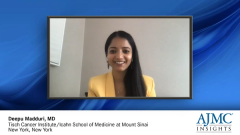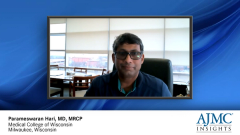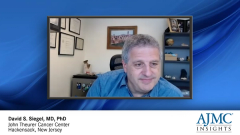
RRMM: Considerations for Using CAR-T in Clinical Practice
Considerations for where CAR T-cell therapy may fit into the standard of care for relapsed/refractory multiple myeloma and insight regarding patient selection for the newer treatment modality.
Episodes in this series

Deepu Madduri, MD: If we think about CAR [chimeric antigen receptor] T-cell therapy, it is a one-time treatment that we’re able to offer to our patients from which we are seeing deep and durable responses. I feel that once a patient has been exposed to 3 or more prior lines of therapy, then the patient would be eligible for CAR T-cell therapy. We know ide-cel [idecabtagene vicleucel] is probably one of the first commercial CAR T-cell products that’s going to be approved and available for our patients with multiple myeloma [MM] sometime in the early quarter of 2021. We’re excited to see that. Additionally, we know we have other CAR T-cell products like cilta-cel [ciltacabtagene autoleucel] coming down the road.
The interesting thing is that the label is likely going to say that these patients must have 3 or more prior lines of therapy. Specifically, these requirements could be having exposure to a PI [proteasome inhibitor], an IMiD [immunomodulatory imide drug], and an anti-CD38 antibody. As such, that would be a significant number of our patients with relapsed and refractory myeloma [RRMM] for whom we’ll be able to offer this therapy to produce some deep, durable responses.
David S. Siegel, MD, PhD: Where CAR T is most extensively studied now is in those multiply relapsed patients, most of whom are triple refractory, while some are penta-refractory. Clearly, the approval is going to be in that space. Therefore, where it will fit clinically is going to be dictated by regulators to a degree. You did the clinical trial in RRMM and multiply RRMM, that’s where this therapy is going to go. I think in the short-term future, we’re going to see CAR T cells being explored in other situations. For instance, high-risk patients earlier in therapy, and hopefully CAR T cells will fit into that space. We’re going to start to understand that there are patient populations for whom CAR T cells are more appropriate.
There are going to be other patients for whom CAR T cells are less appropriate because they’ve received other therapies that make CAR T cells less likely to be effective because they have intrinsic characteristics that make them relatively refractory to CAR T cells. While these are not understandings that we have now, they certainly will be in the short-term future.
Deepu Madduri, MD: We know that CAR T-cell therapy can offer deep and durable remissions in our patients. Who is the right candidate for this treatment? We typically know that CAR T-cell therapy is associated with some toxicities, such as cytokine release syndrome and neurotoxicity, so we generally want to find a patient who’s healthy and fit. Additionally, we hope to find someone who doesn’t have many comorbidity conditions. When people ask, “Does age really matter for CAR T-cell therapy?” I would think not, because we have taken a 79-year-old patient through CAR T-cell therapy without any issues. I believe age is just a number. What we really need to look at is their performance status and what their comorbidity conditions are.
We also want to make sure the patients are not rapidly progressing, as it typically takes between 4 and 5 weeks to manufacture the CAR T cells. Therefore, we want to make sure that the patient will be able to make it to the CAR T-cell therapy with a bridging chemotherapy option. We ideally want to find a patient who is not rapidly progressing and someone who is fit with few comorbidity conditions. We want to be assured that they can go through CAR T-cell therapy understanding that there are some toxicities associated with it.
Newsletter
Stay ahead of policy, cost, and value—subscribe to AJMC for expert insights at the intersection of clinical care and health economics.







